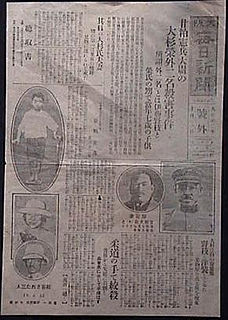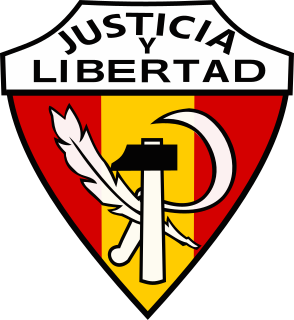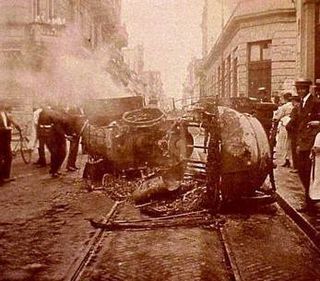 W
WThe Amakasu Incident was the murder of two prominent Japanese anarchists and a young boy by military police, led by Lieutenant Amakasu Masahiko, in September 1923. The victims were Ōsugi Sakae, an informal leader of the Japanese anarchist movement, together with the anarcha-feminist Itō Noe, and Ōsugi's child nephew.
 W
WThe Asturian miners' strike of 1934 was a major strike action undertaken by regional miners against the 1933 Spanish general election, which redistributed political power from the leftists to conservatives in the Second Spanish Republic. The strike lasted two weeks from 4 October to 19 October 1934 in Asturias. The election led to the conservative Spanish Confederation of the Autonomous Right (CEDA), securing a parliamentary majority in the Spanish government on 6 October. The strike and subsequent demonstrations eventually developed into a violent revolutionary uprising in an attempt to overthrow the conservative regime. The revolutionaries took over the province of Asturias by force, killing a large portion of the region's police and religious leaders. Their initial entry into Asturias – armed with dynamite, rifles, and machine guns – culminated in the destruction of some religious institutions, such as churches and convents. The rebels officially declared a proletarian revolution and instituted their own local government in occupied territory. The rebellion was crushed by the Spanish Navy and the Spanish Republican Army, the latter using mainly colonial troops from Spanish Morocco.
 W
WUSAT Buford was a combination cargo/passenger ship, originally launched in 1890 as the SS Mississippi. She was purchased by the US Army in 1898 for transport duty in the Spanish–American War. In 1919, she was briefly transferred to the US Navy, commissioned as the USS Buford , to repatriate troops home after World War I, and then later that year returned to the Army.
 W
WThe Casas Viejas incident, also known as the Casas Viejas events, took place in 1933 in the village of Casas Viejas, in Cádiz Province, Andalusia.
 W
WMaurice Le Noblet Duplessis served as the 16th Premier of the Canadian province of Quebec from 1936 to 1939 and 1944 to 1959. He rose to power after uniting his Conservative party and the breakaway Action liberale nationale progressive faction of the Liberal party of Premier Louis-Alexandre Taschereau, to form a new national-conservative party, the Union Nationale.
 W
WRamón Lorenzo Falcón was an Argentine Army officer, politician, and Chief of the Argentine Federal Police.
 W
WThe Kronstadt rebellion was a 1921 insurrection of Soviet sailors, soldiers and civilians against the Bolshevik government in the Russian SFSR port city of Kronstadt. Located on Kotlin Island in the Gulf of Finland, Kronstadt defended the former capital city, Petrograd, as the base of the Baltic Fleet. For sixteen days in March 1921, rebels in Kronstadt's naval fortress rose in opposition to the Soviet government they had helped to consolidate. Led by Stepan Petrichenko, it was the last major revolt against the Bolshevik regime on Russian territory during the Russian Civil War.
 W
WLeft communism, or the communist left, is a position held by the left wing of communism, which criticises the political ideas and practices espoused by Marxist–Leninists and social democrats. Left communists assert positions which they regard as more authentically Marxist than the views of Marxism–Leninism espoused by the Communist International after its Bolshevization by Joseph Stalin and during its second congress.
 W
WPatagonia Rebelde was the name given to the uprising and violent suppression of a rural workers' strike in the Argentine province of Santa Cruz in Patagonia between 1920 and 1922. The uprising was put down by Colonel Héctor Benigno Varela's 10th Cavalry Regiment of the Argentine Army under the orders of President Hipólito Yrigoyen. Approximately 300-1,500 rural workers were shot and killed by the 10th Cavalry Regiment in the course of the operations, many of them executed by firing squads after surrendering. Most of the executed were Spanish and Chilean workers who had sought refuge in Argentina's Patagonia after their violent strike in the city of Puerto Natales in southern Chile on 27 July 1920 was crushed by the Chilean authorities, at the cost of four carabiniers killed. At least two Argentine soldiers, three local policemen and a number of ranch owners and their relatives also died during the strife. Several of the captured women were raped in the uprising as the rebel forces fought for control of the territory. The most detailed narrative of these events is that by Osvaldo Bayer, summarized in English by Bruce Chatwin in 1976.
 W
WThe Sindicatos Libres was a Spanish company union born in Barcelona, Catalonia. It was established by Carlist workers, and remained active during the early interwar period as a counterweight to the anarcho-syndicalist Confederación Nacional del Trabajo. The group aided employers take action against striking unionists, and was thus criticized as a "yellow union" with proto-fascist leanings; however, its regular members were in practice freely moving between right- and left-wing unionism. The Sindicatos lost momentum during the dictatorship of Miguel Primo de Rivera, and eventually dissolved when the Second Spanish Republic was proclaimed.
 W
WTotalitarianism is a concept for a form of government or political system that prohibits opposition parties, restricts individual opposition to the state and its claims, and exercises an extremely high degree of control over public and private life. It is regarded as the most extreme and complete form of authoritarianism. In totalitarian states, political power has often been held by autocrats who employ all-encompassing campaigns in which propaganda is broadcast by state-controlled mass media.
 W
WTragic Week was a series of riots and massacres that took place in Buenos Aires, Argentina, from January 7–14, 1919. The riot was led by anarchists and communists, and was eventually crushed by the Argentine Federal Police under General Luis Dellepiane, commander of the 2nd Army Corps, and the intervention of the Argentine Army, Argentine Marine Corps and Argentine Navy.
 W
WTragic Week was a series of violent confrontations between the Spanish army and anarchists, socialists and republicans of Barcelona and other cities in Catalonia, Spain, during the last week of July 1909. It was caused by the calling-up of reserve troops by Premier Antonio Maura to be sent as reinforcements when Spain renewed military-colonial activity in Morocco on 9 July, in what is known as the Second Rif War. Many of these reservists were the only breadwinners for their families, while the wealthy were able to hire substitutes.